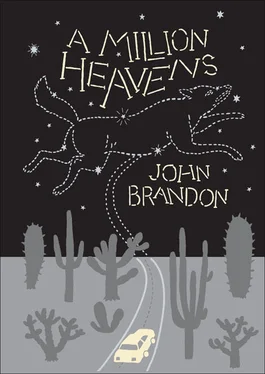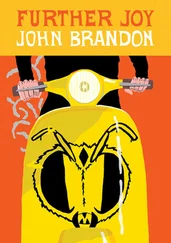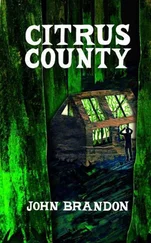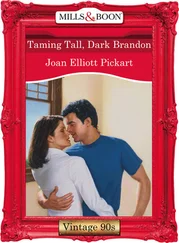He still had not left. The girls were running the station more than capably and he was supposed to be gone. He had summoned the desert to bring its strife against him, and now he was hiding from it. He was on one knee scrubbing the back of the toilet, his bucket of cleaning supplies propped up on the closed lid of the commode. The girls cleaned the bathroom Monday through Saturday, but nobody could make it gleam like the gas station owner. Nobody else cared that once in a while a sharp-dressed woman from Albuquerque or maybe a much bigger city was forced to use the restroom at this out-of-the-way dive and came in expecting the worst facilities she’d ever laid eyes on and when she walked down the narrow hall and opened the flimsy door she fell into utter shock at the fresh tidiness. This is what the gas station owner cared about, apparently. The water in the commode was blue. The floor was spotless. An impressionist Paris street adorned the wall.
The gas station owner moved on to the mirror, pulled the Windex out of the bucket. The gas station owner had told the girls Sunday was optional, and he was glad they’d turned down that option, because that meant he could come in. He could sit in the station like he always had — his place to be, his something to do. His rucksack had been packed for seventeen days now. Perfectly packed. It was at his house, sitting out on his closed-in porch, collecting dust. He’d had his purposeful fun for a time, taking everything out and repacking, fitting in a little more dried fruit, one more pair of socks. The pack was finished and the gas station owner was avoiding his porch. At this point, laying eyes on the pack shamed him. He had his clothes out on the porch too, the clothes he was going to wear the day he started walking, and a pair of fancy boots he’d driven into the city to purchase. It was the first time since he was a child that he’d had his feet measured. The boots had a lifetime warranty, and the pair the gas station owner had were going to meet that warranty easy because they’d never been worn outside the store. The gas station owner collected his supplies and put a new bag in the little trashcan and went and perched behind the register.
Maybe he didn’t want an adventure, he only wanted to plan for one. Maybe he liked to stay cozy, like that kid who worked at the alien observatory had told him. He liked to be curled up warm and safe. Not only was the gas station owner no better than that kid, he was worse. At least that kid had guts. At least he didn’t have to be on his home field and get to make up all the rules. The gas station owner slid a stick of jerky out of a display and after a minute put it back. He was embarrassed he hadn’t left yet. He’d told Mayor Cabrera he was going to be gone awhile, had asked him to keep an eye on the station and on the house, and a few days later he’d run into Cabrera picking up lunch at the diner. He’d lied and said he’d postponed his excursion because the girls needed more training at the station. Like it took a whole lot of know-how. And he was embarrassed the girls knew he was still around. When he came in on a Sunday he couldn’t help but straighten shelves and clean. They noticed. They knew he hadn’t left. He had told himself he was waiting for the right day to leave, for a sign even, waiting to refine his purpose, waiting until he didn’t have a choice but to embark. The fact was, he would never fully understand until he was out there and he did have a choice.
The gas station owner had his station for comfort and his whisky and he’d even gone back to the Bible. He didn’t know what that meant. It was a bunch of knowledge he’d mastered as a kid and then had forgotten. It was the same old Bible he’d carried to church as a tyke, still chock with floods and famine and pestilence and idols and war, full of people with conviction and people without conviction getting punished for it. The gas station owner was doing the opposite of going to church. He was reading scripture six days and then working on Sunday. He wanted Psalms but he needed Proverbs. How long will you slumber, O sluggard? When will you rise from your sleep? A little sleep, a little slumber, a little folding of the hands — So shall your poverty come on you like a prowler, and your need like an armed man .
It was so hazy that he could not tell from the pit of the gully how near sunset was. The sky looked like a stretched old cloth. The floor of the gully was damp and the wolf kept his belly against it. He had been gnawing his foreleg all day, the skin fraying now. He could taste the blood as it quick-dried into the weightless air.
The wolf needed to be this close to the house with the chickens so that when he heard the girl’s car he could make it to the window without missing the next song. He’d heard two of them, and the days he’d heard them he’d felt calm, but when he didn’t hear one he felt lunatic. He had to stay down in the gully so no one would spot him and he couldn’t see anything from down in the gully, couldn’t watch the chickens or watch the humans of Lofte as they kept their routines or broke them. All he saw was an occasional airplane passing overhead, leaving a streak behind it whiter than the white sky, a streak that began near the airport in Albuquerque and would end somewhere the wolf would never go even if he lived forever.
The last time the wolf had gone to the window for a song was almost two full days ago. He needed one soon. The first song had come in the morning and the second one in early evening. If the people who lived in the house next door to the house with the chickens had glanced out their little red-tinted kitchen window they would have seen him. They would’ve reported him.
From the gully the wolf could no longer see the chickens but he could hear them ruffling their feathers and knew when they were asleep. He could hear them bickering, pecking one another’s feet. The wolf was not going to take a chicken. He was charmed by their vulnerability. The wolf was effortlessly guarding the chickens from the coyotes, now in the thick of their thin season. The wolf did not want anything to disrupt the delivery of the songs. He wanted the older woman to stay home all day, safe, boiling water on the stove and staring out the window and sometimes weeping, and he wanted the chickens safe in the yard and he wanted the road shushed quiet with the passing of healthy cars until he heard the racket of the girl’s injured car and she was back from wherever the songs came from. He wanted to be shimmying under the window, pinned against the wall by those spiny bushes that were at once dying and growing unruly. There was a hunger in the wolf that was also a desire to starve, and the girl’s songs were all that could help. He wished he could hear them always and then he could sleep in the day and howl at night like he was meant to.
It had been two days without a song. The sky was losing light. The wolf felt repulsed at the thought of eating, but he had the old itch for a kill. His teeth were sharp and too large for his mouth. He feared he was going to bite his foreleg hard enough to break the bone, and then he’d die stuck in this gully. His own blood was the saltiest he’d ever tasted and it reminded him that some blood was sweet. He would wait until midnight, if he could last that long. If the girl did not return by midnight with a song, he couldn’t be held responsible for whatever wickedness his longing drove him to.
Her period arrived. She had believed she might be pregnant and had not allowed herself to think about it because she didn’t want to jinx it, but she had thought about it anyway, secretly, and she had jinxed it. She stood on the balcony and watched a posse of crows milling about down where she’d planted those avocado pits, their black wings tucked against the wind like men in coats.
Читать дальше












